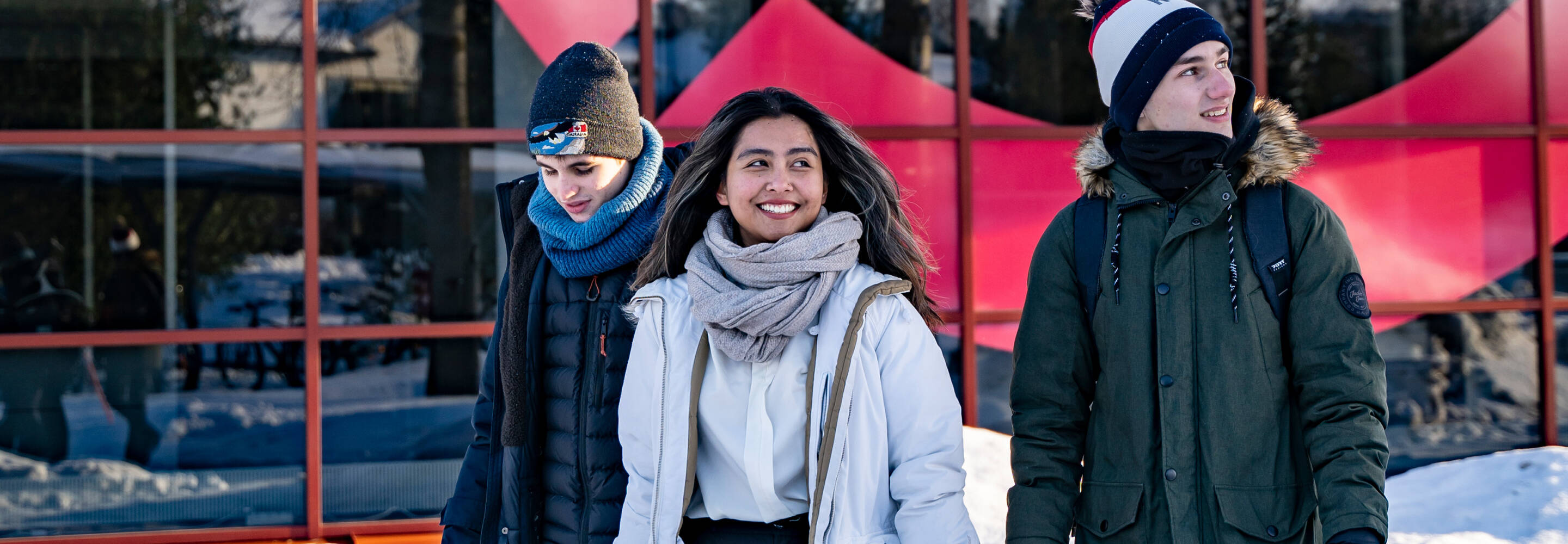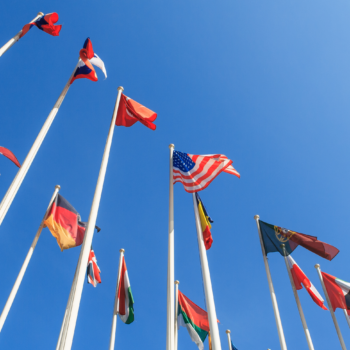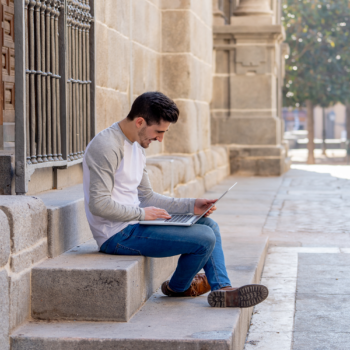
From Centria to the world
Centria’s good network makes it easy to go on exchange, and the likelihood of getting to your desired destination is high. Studying abroad is worthwhile — experience new things, get to know new people and cultures, and gather international experience for future professional life. Going on an exchange may be the best decision of your life.
Student exchange
During the student exchange, you will be doing courses that are related to your studies. You can choose whether you want to participate in a short exchange period of 5 to 30 days, or apply for a longer exchange of at least one term. Student should have completed about 60 study credits at Centria before going on exchange.
You can also go for an exchange and study for a double degree. This means that you will go for an exchange for one academic year in our partner university and once you graduate from Centria you will receive a diploma from both universities. More information about double degrees can be found here.
A semester in Germany was an awesome experience. The studies included a lot of group work, during which you became acquainted with other students. Also in our free time, we spent time together and traveled all over Germany.
Tero Räty, industrial management student
International partners
We have nearly 130 partner universities in Europe, Asia, Africa, the United States, Canada and South America.

How to apply for exchange
Before the exchange, think about where you want to go, when you want to go, and what you intend to study during your exchange.

Practical information for outgoing students
Going on an exchange is an awesome experience! However, before, during and after the exchange, there are many things worth noting.

During the student exchange, you will be doing courses that are related to your studies. You can choose whether you want to participate in a short exchange period of 5 to 30 days, or apply for a longer exchange of at least one term. Student should have completed about 60 study credits at Centria before going on exchange.
As Centria’s student, you have the opportunity to complete your practical training either partially or completely abroad. Practical training abroad is part of your degree in Centria and does not extend your study time. Practical training conducted abroad also looks good in CV.
Practical training can be completed anywhere in the world. Look for practical training period abroad the same way you would look for it in Finland. Prepare a CV and contact the jobs of interest directly. The teacher should accept your practical training plan and it should support your studies in Centria.
Practical training must be full-time, at least 30 hours per week. You must also receive credits from your training in order to be eligible for an Erasmus+ grant. Agree with your teacher when the practical training is best suitable for your studies. Practical training periods abroad usually take between 3 and 5 months. It is important that it lasts at least 2 months, as shorter internships are not supported by Centria.
For practical training the maximum grant is for six months, at least 20 credits must be obtained from the training at that time
You should conclude a practical training contract before the start of your training.
- You can search for suitable internships for example from the following pages: https://app.tiitus.fi/centriajobi/search/jobs and https://erasmusintern.org/
- If you are doing your training in Europe, through the Erasmus+ program, use the following form: Learning Agreement for Work Placement
- Training outside Europe: Overseas Work Placement Application Package
Nursing
training abroad is organized through co-operative universities. You can find information about practical training places here.
The training can be completed through the following exchange programs:
- Erasmus+ Internship
- Overseas Internship
- Healthy Africa
- Nordlink
There are no ready-made practical training positions or application periods in other fields abroad. The student themselves should find a place for practical training. Each application is processed on a case-by-case basis.
Student will receive a daily grant during the exchange period. Only the days when the student should be present at the exchange school (including orientation dates) are taken into consideration. The first part of the scholarship is calculated according to the estimated duration and will be reviewed again once the student has returned home. 80% of the scholarship is paid before leaving for the exchange and the remaining portion will be paid upon the student’s return once all required documents have been returned. A student can apply for additional support for green travel if conditions are met.
There is also an opportunity to apply for a grant in the overseas program. However, there is a limited number of scholarships and priority is given to students who applied for exchange studies in the main application period.
Student can only receive the exchange / training grant from Centria. The purpose of the grant is to compensate for additional costs. It is not possible to receive a grant from Centria for books, flights, insurances or clothing etc.
Grants are generally paid in August or December for long exchanges.
For practical training the maximum grant is for six months, at least 20 credits must be obtained from the training at that time
Grants for long exchanges:
540 € / month:
Denmark, Iceland, Ireland, Liechtenstein, Luxembourg, Norway, Sweden, Faeroe Islands, Switzerland
490 € / month:
Austria, Belgium, Bulgaria, Croatia, Cypres, Czech Republic, Estonia, France, Germany, Greece, Hungary, ITaly, Lithuania, Latvia, Malta, Netherlands, Poland, Portugal, Romania, Serbia, Slovakia, Slovenia, Spain, Macedonia, Türkiye
700 € / month:
Partners from group 1-4 and 6-13
620 € / month:
Overseas-program (countries outside Europe)
Short-term exchange in Europe
79 € / day:
1 – 14 days
59 € / day:
15 – 30 days
Grant for internships
690 € / month
Denmark, Iceland, Ireland, Liechtenstein, Luxembourg, Norway, Sweden, Faeroe Islands, Switzerland
640 € / month
Austria, Belgium, Bulgaria, Croatia, Cypres, Czech Republic, Estonia, France, Germany, Greece, Hungary, ITaly, Lithuania, Latvia, Malta, Netherlands, Poland, Portugal, Romania, Serbia, Slovakia, Slovenia, Spain, Macedonia, Türkiye
700 € / month
Partners from group 1-4 and 6-13
The amount of travel grant per kilometer traveled
10 – 99km, 23 € / person
100 – 499 km, 180 € / person. Additional grant for green travel 210 € / person
500 – 1999 km, 275 € / person. Additional grant for green travel 320 € / person
2000 – 2999 km, 360 € / person. Additional grant for green travel 410 € / person
3000 – 3999 km, 530 € / person. Additional grant for green travel 610 € / person
4000 – 7999 km, 820 € / person
8000 km -, 1 500 € / person
Additional support for students with children
The Erasmus+ program also encourages students with families to go on exchanges together with family. Students with children under the age of 18 receive additional support in the Erasmus+ program for the entire exchange period. In this case, the additional support for exchange study or practical training is EUR 200 per month, in addition to the normal exchange grant.
In order to receive support, you need to:
- select the “perheellisen opiskelijan lisätuki” item from the scholarship form
- fill out the Additional support for student with children form and send it signed to your international coordinator and
- also submit a picture of your kid/children’s passports.
Accessibility aid
The purpose of accessibility aid is to support the accessible participation of persons with special needs in the exchange programme. The aid is intended for individuals who need extra financial assistance to leave for the exchange, due to physical or mental health. The aid will be granted in addition to the normal exchange grant.
Accessibility aid may be granted if:
- the student has an illness or injury which causes significant additional costs during the exchange and
- additional costs cannot be covered from other sources.
Aid may be granted to students who participate in student or practical training exchange, intensive course or network meetings.
If you can be granted accessibility support, please contact your international coordinator before the exchange. The arrangements for the exchange should begin approximately six months before the exchange date so that special arrangements relating to housing, movement or study can be arranged
You don’t always have to go abroad; you can also internationalize at home. You can develop your intercultural communication skills and understanding of different cultures on your home campus. About a fourth of Centria’s students are from countries other than Finland, making it easy to get in contact with international students.
You can gain international experiences for example
- Studying in English degree programme with an international group of students
- Selecting English courses
- Studying foreign languages: Finnish, English, Spanish, Russian, German, French, Italian, Japanese
- Attending lectures by international visitors
- Acting in student union positions, for example as tutor for foreign students
- Taking part in events aimed at international students
- Speaking boldly foreign languages
- Getting to know your fellow students regardless of nationality
Erasmus Policy Statement ja Erasmus Charter

Global Talent Open Badge
Global Talent is an Open Badge created by a group of Finnish universities to showcase their students’ intercultural competences.
Global Talent Open BadgeInternational Office
International Office is responsible for student mobility (incoming and outgoing students), internationalisation at home and relations with partner universities abroad.
International Office contact information